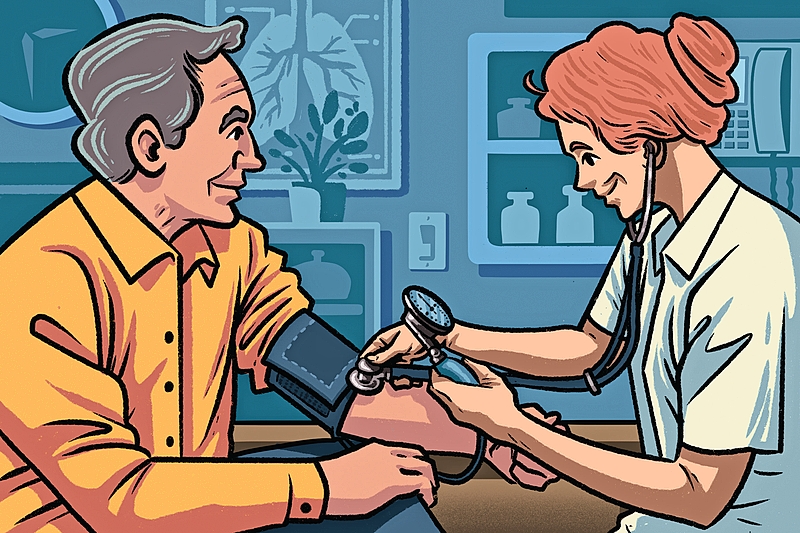Meeting Resistance
By Mark Loehrke
Appears in the March 2022 issue.

People have a tendency to invoke combative or even militaristic terms in casting the diagnoses and treatment of medical issues. Fighting COVID. Battling cancer. Grappling with arthritis.
Perhaps it should come as no surprise, then, when illnesses or diseases metaphorically put up a fight of their own. Such is the case with resistant hypertension—a case of high blood pressure that assumes its pugilistic descriptor by stubbornly refusing to be controlled by a phalanx of antihypertensive medications at maximum doses. Taking the parlance to its natural end, it’s like throwing every weapon you have at the problem and never making a dent. And the results can be deadly—patients suffering from resistant hypertension (about 20 percent of hypertensive patients, according to data from Johns Hopkins) are at a substantially higher risk for heart attacks, strokes, and kidney failure.
Victor Marinescu has been working with these patients for more than 15 years as a cardiologist at Midwest Cardiovascular Institute in Naperville. He notes that the jump from regular hypertension (typically brought on by factors such as obesity, poor diet, and sedentary behavior) to resistant hypertension is often inspired by the presence of other medical conditions that affect blood pressure—including sleep-disordered breathing, such as obstructive sleep apnea, or OSA; chronic kidney disease; endocrinological disorders like diabetes and hyperaldosteronism; or cancers such as pheochromocytoma. And because obesity and diabetes have been on the rise in recent decades, so too have diagnoses of resistant hypertension.
Most patients are already under the care of a primary care physician—and therefore are likely to be referred to a specialist if and when their condition rises to the level of resistant.
But Marinescu says anyone who isn’t seeing their doctor on a regular basis should be on the lookout for symptoms like severe headaches, nosebleeds, vision problems, breathing difficulties, chest pain, blood in the urine, fatigue, and confusion as signs of potential hypertension and seek professional help. In many cases, a combination of medications and lifestyle changes will work to keep regular high blood pressure in check. For those with resistant hypertension, however, this more severe version of the problem may demand a more aggressive approach.
Given that this disease by definition is difficult to control with standard medication, Marinescu says the best course of treatment is generally to focus on addressing the underlying conditions that are contributing to the problem. For example, a referral for a sleep study is often a good place to start, as OSA is a typical underlying factor for high blood pressure. Marinescu notes that within the last decade there has been increased excitement in the medical community around a treatment of resistant hypertension called renal denervationis, which is a femoral catheter-based procedure typically performed by an interventional cardiologist. And even though initial large prospective studies dampened some of that enthusiasm, more recent data suggests that it may indeed prove beneficial for select patients—a glimmer of hope in what looks to be an ongoing battle for the foreseeable future.
Photo courtesy Midwest Cardiovascular Institute


